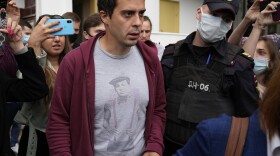STEVE INSKEEP, HOST:
It is abruptly a dramatic moment for democracy somewhere other than the United States. As we are reporting elsewhere, Myanmar's military staged a military coup using election fraud as their pretext. And in Russia, many people spent the weekend demanding the release of opposition leader Alexei Navalny. Human rights activists say more than 5,000 people were arrested nationwide. Navalny, you'll recall, was arrested in January after returning from Germany, where he had been recovering from a poison attack that he blames on the Kremlin.
NPR's Lucian Kim is in Moscow and was at the protest in the Russian capital. Hey there, Lucian.
LUCIAN KIM, BYLINE: Good morning, Steve.
INSKEEP: What did you see?
KIM: Well, yesterday, the police didn't take any chances, and they simply sealed off the entire downtown area. They closed metro stations, blocked off sidewalks to pedestrians. And they flooded the streets with riot police and police trucks. So the protesters responded to that and changed their tactics and just walked around the city center in large groups of people. Hardly anybody I met wanted to admit that they were protesting, since the penalties for unauthorized rallies are really severe. I spoke to one protester. He said his name was Andrei Katkov. He's a 27-year-old manager in a trading company.
ANDREI KATKOV: I'm just walking now. It's my city, and I just want to have some time outside. That's my right.
KIM: He said for him, this was not only a conflict between President Vladimir Putin and Alexei Navalny. He said it was much bigger. He said it's about a clash of generations between people who grew up in the Soviet Union and young people like him with open minds.
KATKOV: We are now living in another country. We have another mentality, no Soviet mentality anymore.
KIM: He represents a growing number of Russians who don't have any memory of politics in the pre-Putin era. And right now, they're feeling very frustrated and boxed in.
INSKEEP: I'm kind of enjoying the idea of a protester just saying, I just happened to be out for a walk, Mr. Kim, along with thousands of other people. But it's clear from what you said that there was a big police presence. Does the Kremlin genuinely feel threatened here?
KIM: Well, first of all, we should emphasize that these protests took place in many towns and cities across Russia, which is hugely significant because in the past, they've mostly been concentrated in large urban areas. This protest is truly national. And there were arrests in dozens of cities, including in the conservative Russian heartland that has traditionally been very loyal to Putin. The Kremlin is extremely sensitive about this, and that's why we saw so many arrests. They're really just trying to scare people off the streets. But to its own constituents, the Kremlin is trying to project confidence. State television is downplaying the size of the protests and trying to portray them as isolated actions. And the Russian foreign ministry is actually accusing the United States of interfering in Russian politics. It's really angry that the State Department has expressed its support for Russians' right to demonstrate peacefully. And these kind of statements, of course, give the Russian authorities a good opportunity to blame outsiders for stirring up these protests.
INSKEEP: Well, very briefly, who's in the opposition, and what comes next for them?
KIM: Well, the Russian opposition is very diffuse. And these protests represent more than just support for Navalny, as we heard from that young man. The Kremlin is cracking down on Navalny's allies inside the country. Navalny's team outside the country is still in charge of these protests. Navalny has a court date tomorrow. And Navalny's team, using social media, is calling on people to show up at the court tomorrow morning.
INSKEEP: Lucian, thanks for the update. Really appreciate it.
KIM: Thanks, Steve.
INSKEEP: That's NPR's Lucian Kim in Moscow. Transcript provided by NPR, Copyright NPR.




